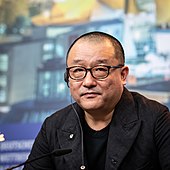Wang Xiaoshuai

Wang Xiaoshuai ( Chinese 王小帥 / 王小帅 , Pinyin Wáng Xiăoshuài ; born May 22, 1966 in Shanghai ) is a Chinese film director and screenwriter . He is often assigned to the "sixth generation" of Chinese filmmakers .
Life
Wang was born in Shanghai, but spent his childhood and youth in Guiyang until he was thirteen . During his time in Guiyang, he began to develop an interest in painting, which he was to deepen when he attended a high school specializing in art in Beijing in 1981, at the age of 15 . After graduating from this school in 1985, he turned away from painting and instead studied directing at the Beijing Film Academy .
After graduating in 1988, Wang worked as an assistant director at Fujiang Film Studio for two years . He made an independent feature film, which he directed with two friends in the lead roles and on a low budget in Beijing, Winter Days, Spring Days (1993). While the film about two young artists whose marriage is slowly breaking up was blacklisted in the People's Republic of China, it was screened at several international film festivals and was awarded the main prize at the International Thessaloniki Film Festival in 1995.
The second feature film followed under the pseudonym Wu Ming with the 1994 also independently rotated from the state, but only in 1997 premiered freezing a Beijing avant-garde Artists, are of different ideas and at the last suicide commits. His first state film was Biandan, Guniang (1998) about two rural farmers who want to try their luck in the city; this film earned him the FIPRESCI Prize at the Shanghai International Film Festival .
After Meng huan tian yuan (1999), Beijing Bicycle was his most successful work to date. The film, which borrows from Vittorio De Sica's bicycle thieves , is about a 17-year-old from the country who moves to Beijing, where a bicycle of his own age is stolen from him. At the 2001 Berlinale , this film was awarded the Silver Bear as the Grand Jury Prize.
This was followed by two films that were shown at the Cannes International Film Festival : In Er di (2003), Wang describes a young man who illegally emigrates to the United States and then returns to China. Shanghai Dreams (2005) won the Cannes jury award .
In competition at the Berlinale 2008 was Zuo you shown; the script for this film earned Wang a Silver Bear . It is about divorced parents who find out that their daughter has leukemia . His film Rizhao chongqing was featured in the competition at the 2010 Cannes Film Festival .
The drama Until then, my son , the first part of Wang's planned “Heimat Trilogy”, was premiered on February 14, 2019 in the competition at the 69th Berlinale .
Filmography
- 1993: winter days, spring days ( 冬春 的 日子 , Dongchun de rizi )
- 1997: Freeze to death ( 极度 寒冷 , Jidu hanleng )
- 1998: Biandan, guniang ( 扁担 · 姑娘 )
- 1999: Meng huan tian yuan ( 梦幻 田园 )
- 2001: Beijing Bicycle ( 十七 岁 的 单车 , Shiqi sui de dan che )
- 2002: Jeonjaeng geu ihu ( The New Year segment )
- 2003: He di ( 二弟 )
- 2005: Shanghai Dreams ( 青 红 , Qing hong )
- 2007: Zuo you ( 左右 )
- 2010: Chongqing Blues (Rizhao Chongqing)
- 2011: 11 Flowers (11 weeks)
- 2019: See you then, my son ( Chinese 地 久 天长 , Di jiu tian chang )
Web links
- Wang Xiaoshuai in the Internet Movie Database (English)
Individual evidence
- ↑ a b c http://www.sensesofcinema.com/2003/great-directors/wang/
- ↑ http://www.china.org.cn/english/NM-e/82622.htm
- ↑ Awards of the Berlinale 2008 , accessed on April 29, 2017.
| personal data | |
|---|---|
| SURNAME | Wang, Xiaoshuai |
| ALTERNATIVE NAMES | 王小帅 (Chinese) |
| BRIEF DESCRIPTION | Chinese film director and screenwriter |
| DATE OF BIRTH | May 22, 1966 |
| PLACE OF BIRTH | Shanghai |